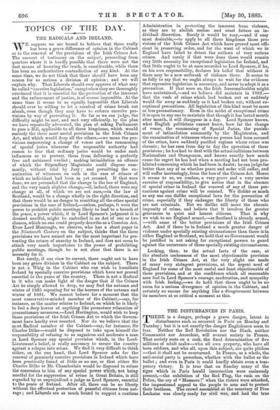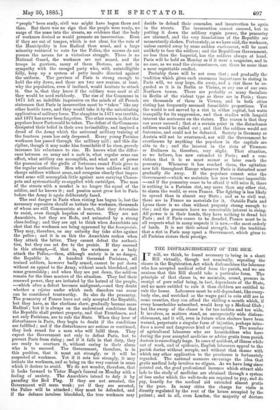TELL DIST1TRBANCES IN PARIS. T HERE is a danger, perhaps a
grave danger, latent in disturbances such as occurred in Paris on Monday and Tuesday ; but it is not exactly the danger Englishmen seem to fear. Neither the Red Revolution nor the Black, neither Communist nor Anarchist, will overset society in France. That society rests on a rock, the fixed determination of five millions of adult males—who all own property, who have all been soldiers, and who all, upon this subject, are quite pitiless —that it shall not be overturned. In France, as a whole, the anti-social party is powerless, whether with the ballot or the bullet ; and even in Paris it could hardly obtain even a temporary victory. It is true that on Sunday many of the signs which in Paris herald insurrection were ominously present,—the exhibition of the Red Flag, the rush on the Police, the cry of "Massacre !" when the rioters were attacked, the impassioned appeal to the people to arm and to protect their brethren. The crowd assembled at the cemetery of Pere Lachan' ie was clearly ready for civil war, and had the true "people" been ready, civil war might have begun there and then. But there was no sign that the people were ready, no surge of the mass into the streets, no evidence that the body of workmen desired or would promote an insurrection. Even if they are out of temper, which is not clear, for the vote of the Municipality is less Radical than usual, and a large minority ventured to vote for the Police, the masses do not possess the means for a victorious struggle. There is no National Guard, the workmen are not armed, and the troops in garrison, many of them Bretons, are not in sympathy with the enraged party who, with unintelligible folly, keep up a system of petty insults directed against the uniform. The garrison of Paris is strong enough to hold the city down, and there are two new reasons, at least, why the population, even if inclined, would hesitate to attack it. One is, that they know if the soldiery were used at all they would be used ruthlessly. The rise of the Commune in 1871 left an indelible impression on the minds of all French statesmen that Paris in insurrection must be " taken " like any other hostile town, and they would take it by the unhesitating application of military force. The slaughter in 1871 was terrible, and 1871 has never been forgotten. The other reason is, that the populace know Paris could be taken. The defeat of the Commune dissipated their belief in their own invincibility, and inspired a dread of the Army which the universal military training of the fourteen years has only deepened. Every young Parisian workman has passed through the military mill ; and this discipline, though it may make him formidable if he rises, gravely increases his reluctance to rise. He knows what the difference' between an army and a mob is, what regular arms can effect, what artillery can accomplish, and what sort of power the possession of the girdle of fortresses round Paris gives to the regular authorities. Men who have been soldiers will not charge soldiers without arms, and recognise clearly that improvised arms will accomplish little against men carrying Chassepots and systematically re-supplied with cartridges. The man of the streets with a musket is no longer the equal of the soldier, and he knows it ; and passion must grow hot in Paris before the Army is again deliberately faced.
The real danger in Paris when rioting has begun is, lest the necessary repression should so irritate the workmen, thousands of whom are still Communists at heart, that they determine to resist, even though hopeless of success. They are not Anarchists, but they are Reds, and animated by a strong class-feeling ; and they are apt to think when Anarchists are shot that the workmen are being oppressed by the bourgeoisie. They may, therefore, on any unlucky day take sides against the police ; and it is on this the Anarchists reckon when they attack the latter. They cannot defeat the authorities, but they can set fire to the prairie. If they succeed in this attempt,—if, that is, the workmen as a body attack the Police,—then, although society is in no danger, the Republic is. A hundred thousand Parisians, all trained soldiers, however badly armed, cannot be put down without an appeal to the Army, without much bloodshed, and some generalship ; and when they are put down, the soldiers remain for the time masters of the situation. They feel their renewed power, they are irritated by the hatred of the people, —which after a defeat becomes malignant,—and they doubt whether a regime under which such disorders can occur can be considered trustworthy. So also do the peasantry. The peasantry of France have not only accepted the Republic, but they have, as the elections show, gradually become more Radical ; but it is always on the understood conditions that the Republic shall protect property, and that Frenchmen, and not only Parisians, are to rule the State. When they hear of disturbances in Paris, they begin to doubt if the conditions are fulfilled ; and if the disturbances are serious or continued, they look round for a man who will fulfil them. They expect the Government not only to defeat Paris, but to prevent Paris from rising ; and if it fails in that duty, they are ready to overturn it, without caring in their alarm who is to succeed. The Government, therefore, is in this position, that it must act strongly, or it will be suspected of weakness. Yet if it acts too strongly, it may irritate the workmen, and so bring on the very contest in arms which it desires to avoid. We do not wonder, therefore, that it looks forward to Victor Hugo's funeral on Monday with a feeling of anxiety. The Anarchists intend to defy it by parading the Red Flag. If they are not arrested, the Government will seem weak ; yet if they are arrested, the Police will be attacked ; they must be defended, and if the defence involves bloodshed, the true workmen may
decide to defend their comrades, and insurrection be again in the streets. The insurrection cannot succeed, but in putting it down the soldiery regain power, the peasantry are alarmed, and the very foundations of the Republic are momentarily shaken. Fortunately, as we have said, the workmen, unless carried away by some sudden excitement, will be most unlikely to face the soldiers; and the Republican Government, no less than the Imperial, has the soldiers always at hand. Paris will be held on Monday as if it were a magazine, and in no case, as we read the circumstances, can there be more than a most regrettable conflict.
Probably there will be not even that ; and gradually the tradition which gives such enormous importance to rioting in Paris will, we may hope, die away, and a riot there be regarded as it is in Berlin or Vienna, or any one of our own• Northern towns. There are probably as many Socialists in Berlin of the violent type as there are in Paris ; there are thousands of them in Vienna, and in both cities rioting has frequently assumed formidable proportions. Yet the world is not moved by a riot in either capital, but waits tranquilly for its suppression, and then studies with languid interest the sentences on the rioters. The reason is that they can never succeed ; that at a certain point in the disturbance soldiers would be called out ; and that the soldiers would not fraternise, and could not be defeated. Society in Germany or Austria will not be overturned, nor will the Government be overthrown by anything the populace in the capitals are able to do ; and the interest in the riots of Viennese or Berliners is, therefore, very slight. That situation, as we believe, has now extended to Paris ; and a conviction that it is so must sooner or later reach the peasantry. Whenever it has reached them, the agitation now felt throughout Europe whenever Paris is disturbed must gradually die away. If the populace cannot seize the Government—which we maintain has now become impossible —and if the peasantry cease to be afraid it will seize it, there is nothing in a Parisian riot, any more than any other riot, to alarm the world, or even France. The fighting is less likely to spread than in almost any State ; and as to civil war, there are in France no materials for it. Outside Paris and Lyons there is no class without property strong enough to• rise ; and the peasants have no conceivable interest in rising. All power is in their hands, they have nothing to dread but Paris ; and if Paris ceases to be dreaded, France must be in all respects what in many respects it is now,—the most orderly of lands. It is not their• actual strength, but the tradition• that a riot in Paris may upset a Government, which gives to all Parisian rioters their prestige.















































 Previous page
Previous page